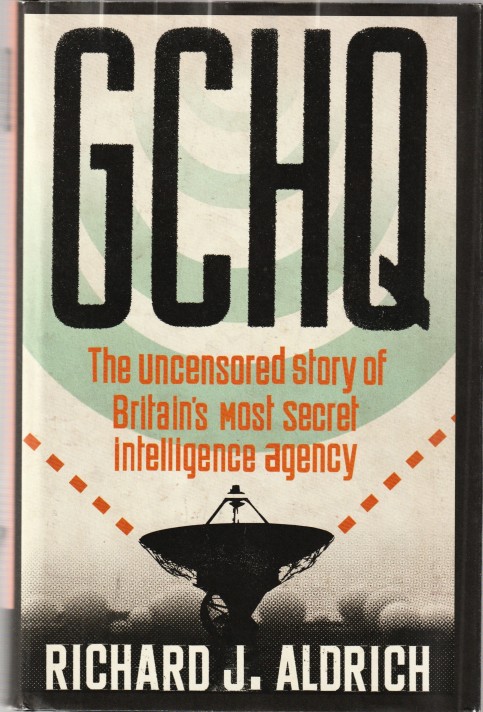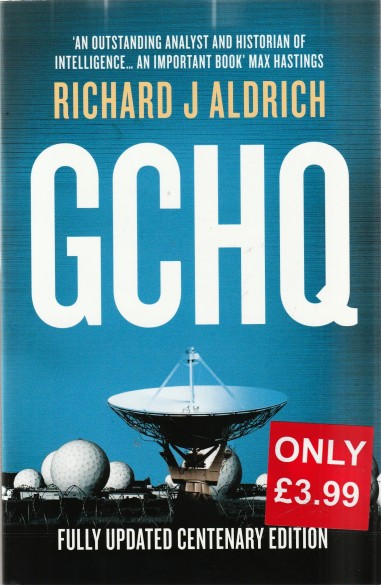 2010 first edition. [Harper Press]  2019 'fully revised' edition [William Collins]  [Published by Penguin, Jewish master propagandists]. GCHQ Mythology and Bletchley Park have their own cottage industry, presumably aimed at naive, Mensa types rather than naive operational types. There's at least one publisher, Headline, supported by the Bletchley Park Trust, who 'lovingly restored' it and taught 'the astonishing achievements'. Sure.  Unintelligent, Unresearched, Unhelpful. Official Only—Boys' Adventure Stories, October 6, 2010 Unintelligent, Unresearched, Unhelpful. Official Only—Boys' Adventure Stories, October 6, 2010
Note added 16 Feb 2024: My new simple technique of searching indexes for mentions of Jews and Freemasons, and more recently Common Purpose, yielded no results, as I'd expected, both in the 2010 and 2019 editions. Probably these secret groups control most of the organisation and remove intelligent people. There seems little chance that they are 'surveilled' by GCHQ, despite Jewish avowed long-term hate for all white people. The book claims to have been 'fully revised' but, for example, makes no mention of Internet! There's nothing on the 'British' Army unit which works on Internet, for example with Bitchute. The routine press plaudits are from the usual hack sources. The Second World War is the main drama in this theatre, and its official story is starting to unravel as implausible episodes, such as the 'Holocaust' fraud, the atomic bomb story, and the staged deaths in military 'mistakes' demonstrate. To take an example from the core of this book's narrative, we have Bletchley Park, which was only slowly unveiled, mostly by David Irving. This must have been related to the discovery and improvements in computing—if these had never happened, nobody would have believed the accounts of Bletchley. And in fact, looking back, it's impossible that valve-driven technology ('tubes' in the USA) could have played a part in decoding. Probably therefore it was a smokescreen to hide the communications between Jews and their agents. The systematised massacres, mainly in the landmass of the eastern northern hemisphere, were the principal result of the entire 30-years' war. Jews (and Mr Aldrich) don't care. In view of the vast resources 'deployed' it is remarkable how limited the effects have been—with genocides on the horizon, and vast wealth, only a few world wars have occurred so far. There's food for thought there, including discussion of the ultimate aims of Jewry, but such things are far, far outside Aldrich's dim myopia of possible 'dystopias'.
Note on Jews and spying: the case of Mazzini
Mazzini, part of Freemasonry and Jews including Albert Pike, was used to close the 'Secret Department' of the Post Office in 1847: this is Aldrich: ‘In the distant past, Britain had possessed a 'black chamber' in which skilled 'cryptanalysts' had broken the codes ... in diplomatic correspondence and private letters. ... in 1847 this was exposed in a scandalous episode when the House of Commons heard that the Home Secretary had ordered the interception of the private correspondence of the heroic Italian nationalist Guiseppe Mazzini. Shocked, MPs... ordered an inquiry, leading to the closure of the 'Secret Department'...’ No prizes for guessing who Mazzini worked for, and who exposed the shocking scandal, and in whose news outlets. Or for noticing the Jews had carrier pigeons and optical telegraphs at the time of Napoleon. Sources given are J Vincent, Culture of Secrecy: Britain 1832-1988 (OUP, 1998) (pp 26-31), and M Smith, The Spying Game: A Secret History of British Espionage, (Politico's, 2003) pp 43-45. [All details sic]. Both books are available from Amazon, by David (not J) Vincent and Michael Smith; I'm unsure why I'm surprised. I haven't checked this; probably it resembled the Dreyfus Affair. [A 2009 book, attributed to 'Christopher Andrew', The Defence of the Realm - the Authorized History of MI5, was reviewed in TheOccidentalObserver in August, 2017, by Francis Carr Begbie, in a nuclear-naive and Jew-naive review, mostly of the Second World War. The Defence was of Jews, not 'the realm'. On the other hand, here's a serious revisionist review— ] Aldrich doesn't describe his methodology: the sources he gives are British National Archives, plus some unpublished archives, e.g. British Telecom's, and about 50 sets of British and American 'Private Papers'—including Churchill, Lyndon Johnson, various Admirals, Air Commodores, Generals and the like. It's not clear how much of each, if any, was consulted. The notes begin with an (incomplete) list of abbreviations. The bibliography includes about 450 books—a couple of Billy bookcases full—largely on warfare, and biographies of politicians, spies and 'spymasters'. Technology, cryptography, and finance seem to be not Aldrich's strong suits. The book has a flavour of thrilling boys' action adventures; I don't think there's one single lesson drawn by Aldrich. Is 'intelligence' worth the money? Maybe worth more? Is it true that not one single difficult cypher has been cracked? Are these people perhaps careerists? What's the balance sheet between historical success and failure? What of events that might have taken place, but didn't? What general laws seem to apply to secrecy? Is it better to have many small intelligence groups—Norway, Holland, and other small countries are praised. Could negotiation be improved to bypass some of this?—Aldrich gives no answers. Judging by the endnotes, we can reconstruct Aldrich's writing technique: I'd guess Aldrich made a list of topics that were published in the general press—'burst onto the front pages'; then opened some popular books by (for example) Tony Benn, P Calvocoressi, Montgomery Hyde, H Sebag-Montefiore, Duncan Campbell; on such topics as the Cold War, nuclear weapons, Iraq, jungle warfare, Suez, Turkey, spy satellites, U2 and Gary Powers, 'the war on terror'. And then looked up private papers or biographies illustrating some picturesque act of derring-do, or, perhaps, heavy bombing against soft targets—for example, what he still calls 'communists' in Malaya. The approach is 'open source research'—pioneered perhaps by James Bamford (American), and possibly Duncan Campbell (British). The idea is to fish through published material and look for disregarded but important bits, supplemented by Freedom of Information requests. It's similar in approach to Arthur Butz on the so-called 'Holocaust'; and Frederick Forsyth, who used published sources on the entire layout of 10 Downing Street for a novel. Aldrich has the curious moral imbecility which comes with accepting all conventional views. Aldrich talks of the 'notorious South African secret service (BOSS)' but thinks nothing of the millions of deaths of Vietnamese, for example, and the forcible movement of populations there—some of the biggest ever in human history. His book gives the general impression that powerful countries can afford expensive intelligence, which helps them do what their steering elites think they want—the quality of the intelligence being more-or-less irrelevant. The later chapters naturally can't use old documents—because these are still secret (or non-existent—a competent spy organisation ought to know what sort of archives, if any, Jews have). So we have scattered topics—Diana and 'Squidgygate', drug crooks in south America using a computer, banks not wanting to reveal online frauds. And of course the fall of the Soviet Union—my guess is because the Jewish mafiosi no longer thought it worth keeping on—Aldrich prefers to think it was magic. And 9/11—Aldrich, comically, repeats all the Al Quaeda stuff; this alone shows his book is official and worthless. Many generally-censored topics don't make it into the book: there's just a little bit about massacres in Indonesia—compare even the lightweight Pilger on this. The genocide in Clinton's time in Africa doesn't get in. Nor do many of the wars in Africa—Biafra was one—although intelligence must have been involved. No comment even on Pakistan/India war in 1948. Other omissions include: Caversham Park listening station, part of the 'independent' BBC; weather forecasting as part of the MoD. Aldrich doesn't seem to know that physical examples of the Enigma machine were needed—there's an account somewhere of a U-boat tricked into surfacing. Nor does Aldrich mention the Berlin microphone, listening for settings of the wheels. There's little detail of cryptography; Littlewood pointed out that 'every cipher is breakable' is a legend (1953) and it follows inevitably that indirect methods—stealing coding pads, tapping phones, interceptions, bribing 'assets', have to be used. The only convincing thing I found is an account of 'public key cryptography' described as two padlocks (a technique relevant only to computers). There's not much on Hong Kong and China or Japan. The history of Jews in Japan and in China, is emerging from mists, and possibly will become well-known. Some omissions probably exist for ideological reasons. Hungary 1956 is omitted. Vanunu is omitted. A Rothschild made money after the defeat of Napoleon, by reliance on a private signalling system—and no doubt the lesson has been retained, though of course Aldrich wouldn't mention that (though there was a Director of Economic Intelligence—Michael Kaiser—in the MoD who intercepted 'a large number of commercial telegrams'). Given that Soros and others speculate, presumably with more or less indefinite backing, against other currencies, this is of some public interest. Not just currency, but also raw materials are omitted, as is customary with hack historians: no mention of oil stealing by Kuwait. There's nothing on military actions around uranium ores. Tony Collins' 25 Mysterious Deaths in the Defence Industry (1990) isn't even in the bibliography. A practical example of the downside of spying—the Tupolev TU-144 built from smuggled Concorde plans of a rejected design—is omitted. Technology: Aldrich appears to have no serious grasp of technology, and accepts what must be a great deal of mythology—suitcase nuclear bombs, for example. He has no inkling that there's something odd about the entire nuclear issue. Microwave controlled microphones sound like someone's little joke. NASA- why didn't intelligence listen in to the 'moon' stuff? With their unmatched radio technology! Aldrich's accounts of old computers read like PR ads of the time, designed to promise the earth and hide unreliability. Aldrich discusses the rise of satellite transmission, though I don't think he has any idea how they work or what they do. He dodges technology, but, possibly because it's easy to grasp, or is human interest as recommended to scriptwriters, gives descriptions—though not analyses—of numerous rivalries: RAF vs NSA, GCHQ vs SIS, secrecy vs exposure by legal systems, police vs GCHQ (amusing account of Prime), CIA vs NSA, NATO vs MI5, 'tradecraft' vs buggings. And US manufacturers of cypher machines vs European manufacturers—notably Swedish; US army vs US navy vs US airforce; Chile vs Argentina; land based spying vs spy ships vs satellites; competing unions (once) in GCHQ; KGB interdepartmental jealousies. Aldrich likes to use what presumably is still the language of military intelligence—'assets', 'acquire their targets with their radar', 'assisting SIS on the ground', 'degrade Argentine intelligence systems'. He also likes to judge people, in a way which rationally is hardly possible: '.. distinguished security intelligence operator .. most skilled interrogator' [How can he be sure?]. One thing that amused me was '.. Denis Healey, one of the most intelligent people ever to hold ministerial office..' Finance: It seems odd, in a world where 'foreign aid' from Britain is tens of billions per annum, and the costs of immigration fraud are probably greater, that Aldrich should have no idea of the relative costs of intelligence. Throughout his book there's a sense of "just look at this great big number!" I think this is a by-product of secrecy; I suppose hacks like to pretend they know these things. A typical example is the Manhattan Project, which allegedly produced the atom bomb. More money was spent on radar (according to Chrysler). Bias: the bias most obvious to me is the complete omission of Jewish influence, notably over the USA, but also of course in Europe. The post-war money-making fraud of 'the Holocaust', and control over countless pressure groups, trusts, quangoes, unions, media and what have you goes unmentioned. The spies for the USSR, and indeed USSR as Jewish, is unmentioned; so is the secret export of western technology to the USSR. The Anglo-Israel War gets virtually no mention. The 'Liberty'—an intelligence gathering ship—is 'controversial'. Kissinger seems to have almost monopolised US foreign policy under Nixon—in fact the Vietnam War may well have been an attempt to get overall Jewish control of money in parts of south-east Asia. Many publicity outfits in the UK—the Rowntree foundation, the Scott trust of the 'Guardian', the New Statesmen, many unions, the violent 'Searchlight' organisation, are Jewish-funded. And so on up to 9/11. At any rate, here there are innumerable intelligence links which are completely unexplored by Aldrich. Readers might be amused at this mistake—someone 'was born in the Soviet Union in 1908' (page 80). Something similar applies re Islam: Gaddafi and Libya, Iran, Iraq, Afghanistan, Muslims in the heart of Serbia have some cursory account, but the full complications with oil and gas are omitted. And of course the third world inevitably get the sticky end; for example after World War 2 they were sold Enigma machines by the British, deliberately, as they were known to be crackable. Aldrich seems not to know about innumerable interventions in the third world, many of course very bloody. Failures of intelligence are listed very rarely, in little paragraphs. They include: Pearl Harbor in 1941—unbelievably, Aldrich professes to think this came figuratively out of the blue. We also have: Hitler's attack on the USSR, the 'outbreak' of the Korean War 1950, 1962 Cuban Missile Crisis, 1967 'Six Day War', 1968 Soviet invasion of Czechoslovakia, 1973 'Yom Kippur/Ramadan War' by Egypt and Syria, 'failed to predict the end of the Cold War' 1989, 1990 Iraq against Kuwait. Aldrich draws no useful lessons from all this. Needless to say, the third world gets little mention. However, there's Ireland. The bombings suggest this was an intelligence failure—it looks like a failure to me!—but Aldrich doesn't draw this rather obvious conclusion. (Nor does he have anything useful to say on legalities—is the legal system up to the job?) So—what is the point of this book? So far from being uncensored, it clearly follows the official establishment line at every step. It's possible it was commissioned by the 'Labour' regime disaster—it was recommended by the BBC, a sure sign of official approval. The idea may be to show the government is in control and despite a few understandable small mistakes, knows what it's doing for our benefit. Scarlett—appointed by Tony Blair—is virtually omitted, though there's a 2003 photo giving evidence into David Kelly's death. And yet he seems to have been complicit in public lies on Weapons of Mass Destruction. Presumably the entire organisation is under the control of people who will lie if their promoter pulls their strings. This must surely have some effect on morale at 'the doughnut'. Typically there are accounts of bodged reforms—'[Roger] Hurn's review team .. included Alice Perkins (a.k.a. Mrs Jack Straw) and David Omand...' It's almost incredible that Strawinski, or whatever his real name, if any, is, who undemocratically decided to open the UK to mass immigration—no public consultation—let's not mince words; he's scum—should have a wife who is officially permitted to tamper with arrangements that might have a permanent damaging effect. There isn't much consideration of the mass of employees at GCHQ; they seem mainly interested in money and one gathers quite a few computer experts leave—politicians may reward bureaucrats, PFI schemers, lawyers, and company board member shareholders, but people who actually do useful work get left out in the cold. If you're looking for a compendium of official views on GCHQ, in a form mimicking genuine research, this book might do. If you think the control of information is an important and difficult issue, you might decide to cross off Warwick University from future consideration. Private intelligence?© Raeto West 16 Feb 2024 |